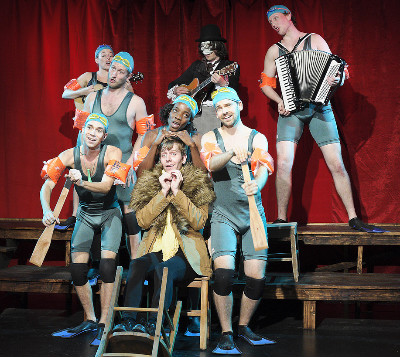Frogs
Produced by Fault Line Theatre

The cast of FROGS. Photo by Jacob J. Goldberg.
BOTTOM LINE: Gods, men and the dead cavort together (sometimes too much) in this classic comedy from the ancient world.
There are many elements that separate us from the world of Aristophanes’ Frogs. First produced almost 2,500 years ago, the play is written in a dead language, takes place in a nation that no longer exists, and makes reference to numerous political and cultural figures that barely anyone remembers. In spite of all this, or indeed because of it, modern thespians can’t help themselves. If you’ve only seen or read one play by Aristophanes, it’s probably Lysistrata, the “make love, not war” comedy that seems especially relevant in the Iraq/Afghanistan era. (A musical adaptation set in the world of college basketball comes to Broadway this fall.) Fault Line Theatre, which cut its teeth with tragedy last year (Marlowe’s Doctor Faustus), continues its exploration of the classics by mounting another of the writer’s major works, whose subject, ultimately, is the purpose of theatre itself.
Aristophanes (the only comic playwright of the period whose work survives) sends his hero, the god Dionysus, into the underworld to fetch the recently deceased tragedian Euripedes, whose contribution to the arts is sorely needed in war-weary Athens. The deity takes with him his slave Xanthius, and together, the pair confront Charon, the dead's ferryman; various locals who are pissed off at Dionysus's brother, the "heroic" Heracles; and the shade of Aeschylus, the long-dead playwright who resents the celebrity of the newly-arrived Euripides and makes his own bid to be rescued from the pit of hell and taken back to Athens. The frogs of the title croak (and in this production, dance) as Dionysus crosses the river Styx into Hades, providing the sole line of poetry that comes down to us un-translated from the Greek original: "Brek-ek-ek-ex ko-ax ko-ax!" (This nonsense line was once so famous among the classically educated, it's referenced in The Pirates of Penzance and incorporated into quite a few university fight songs.)
In Fault Line’s production, the frogs’ song, staged as a go-for-broke vaudeville-style musical number, is where the show really comes alive, fifteen minutes in. The company generally plays the text Three Stooges-style and over the top, and not all of the comic moments land. Frogs is full of crude, low-brow humor (jokes about defecation abound), but is far wordier than your average gross-out comedy, and sometimes the wit of the poetry gets lost or rushed as we are hurried along to the next set of hijinks. The simplest, and longest, sequence in the play — the debate between Aeschylus and Euripides as to which is truly Athens’ greatest playwright — is its strongest. As two great dramatists battle it out, hilariously parodying each others’ work and demonstrating their own foibles, Dionysus is at a loss: “How am I to judge? How can I? One is so clever, the other so satisfying. One a master, the other I just love.” Those who know the playwrights’ work (namely, serious theatergoers) will laugh the hardest at Aeschylus’s stuffy condescension and Euripides’s rockstar arrogance.
Stand-outs in the cast of nine include Karl Gregory and Craig Wesley Divino, who play Aeschylus and Euripides, respectively; Blake Segal, as the abused Xanthius; and Rebecca Gibel, who handles her chorus duties and various small roles with aplomb. Everyone on stage is multitalented: actors, singers, dancers and sometimes instrumentalists as well. Not all are ideally cast — always a danger when a company attempts to match its members to a production. I wanted more godliness in the gods depicted — yes, part of the humor lies in watching the immortals behave like ordinary people, but we want to see them turn on the Olympian fabulousness from time to time as well.
The core message of Frogs is that when all else — politics, philosophy, militarism — has failed, a society can still be saved by its theatre. This was a far less radical notion in ancient Athens, where dramatic festivals were an indispensible part of the culture, than it is now, when professional theatre is largely seen as an elite, inaccessible art form. Fault Line’s sophomore production doesn’t necessarily prove Aristophanes’s point, but it provides an important reminder that “classical” does not always mean “serious.” It may be the only show in town where history nerds and Three Stooges fans will both find something to enjoy.
(Frogs plays at Fourth Street Theatre, 83 East 4th Street between 2nd Avenue and the Bowery, through November 19, 2011. Performances are Tuesdays through Fridays at 7:30; Saturdays at 2PM and 7:30PM; and Sundays at 7:30PM. Tickets are $18 and are available at smarttix.com or by calling 212.868.4444.)

